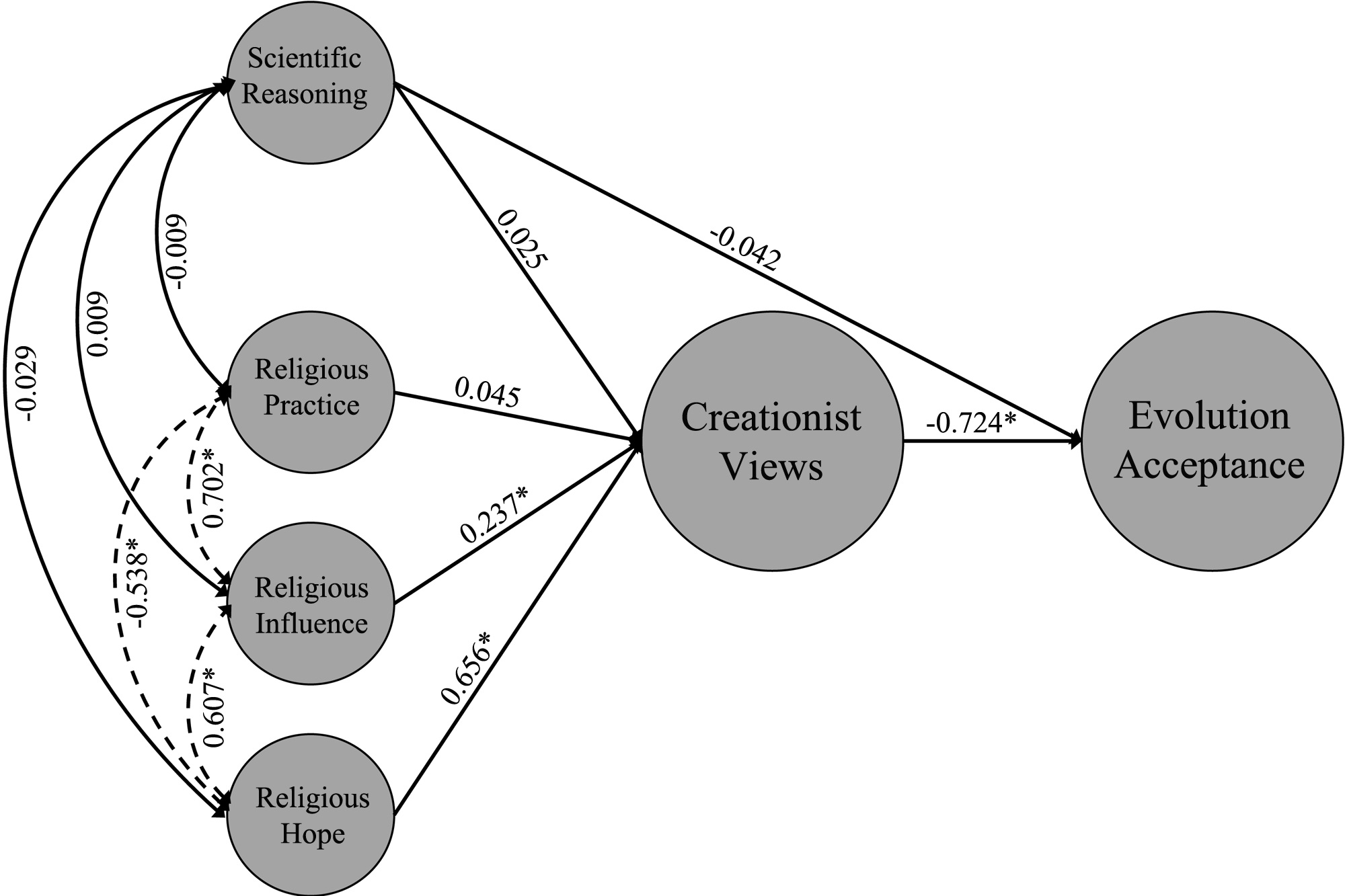
Why reject evolution?
Humans have long wondered and debated the scientific and theological explanations for our world and the life upon it. Scriptural accounts describe the creation as a series of events by a creator resulting in earth’s current diversity (including humans), whereas, science suggests descent with modification from a common ancestor over long periods of time (evolution), resulting in the vast diversity we see today (again, including humans).
Despite overwhelming evidence for evolution, a large portion of the US (and the world) continues to reject the theory. The question becomes why, in the face of so much convincing evidence, do people still not accept evolution as a process that occurs to shape the existence of life on this planet?
Hypotheses about causes of rejection
The second deficit model based hypothesis is that people reject evolution because they lack scientific reasoning ability. This hypothesis is the basis of our current study.
The research literature demonstrates that religion is a major barrier to the acceptance of the theory of evolution. What is it exactly about ‘religious’ individuals that causes rejection of scientific evidence?
Two prominent hypotheses stem from a ‘deficit model’. The first supports the idea that a deficiency of knowledge is to blame for rejecting evolution and that people reject evolution out of simple ignorance of the facts, the evidence, and the mechanisms. However, the literature demonstrates that in most cases, a simple education in the facts is not enough to change people’s minds.
The second deficit model based hypothesis is that people reject evolution because they lack scientific reasoning ability. This hypothesis is the basis of our current study. If true it presents a pedagogical impediment because the challenge becomes more than just teaching students the facts, but teaching them scientific reasoning skills (a much harder feat, according to research).
Our Study
To test for a relationship between underlying scientific reasoning ability and acceptance of evolution, we specifically targeted religious individuals based on the fact that religion seems to be the underlying deterrent to evolution acceptance. Participants were asked to respond to a survey to rate their religiosity, complete a measure of their scientific reasoning ability, and to respond with their degree of agreement with various creationist and evolutionary statements.
We produced a model of the relationships between these factors where we hypothesized that scientific reasoning ability would predict both religiosity and agreement or disagreement with evolutionary statements. We were intrigued (yet not surprised) that there appears to be no relationship between the scientific reasoning ability of religious people and their acceptance of evolution. Nor was there a relationship between scientific reasoning ability and religiosity among our study group. Not surprising, however, is that religiosity is a negative predictor of the acceptance of evolution (a finding that has been thoroughly verified in the literature).

What does the data mean?
There is not a deficit in an underlying ability to reason that causes religious people to reject evolution. Our data clearly shows that individuals can be highly adept at scientific reasoning and still reject evolution (most likely on religious grounds). Our data also shows that one can be severely lacking in scientific reasoning ability and still accept evolution. It appears from this study that worldview (or religion), not intelligence, is the main driver of this decision.
What does this mean for education?
Our data clearly shows that individuals can be highly adept at scientific reasoning and still reject evolution (most likely on religious grounds).
In a recent editorial in Science Magazine, Dr. Katherine Hayhoe discusses an eerily similar dilemma in the realm of public acceptance of Climate Change. She argues that most scientists assume that providing more data to individuals will change their minds but research is showing this doesn’t work! Why? Because it has “much more to do with identity and ideology than data and facts”. This parallels what we are finding in evolution education. Data and facts are not enough. It is a worldview issue.
A likely solution is to offer students pathways that allow them to maintain their worldview while accepting the scientific facts. In our current research, we propose the use of a ‘Reconciliatory Model Approach’, one in which students are encouraged to find a bridge between the science and their religious beliefs. And this approach, at least preliminarily, appears to be working. The goal is to still cover the facts and encourage sound scientific reasoning, but approach it with a goal of reconciliation rather than assuming a deficit model and suggesting that their lack of acceptance is due to ignorance.
Why is it important?
Our goal is to show that scientific reasoning ability is not predictive of evolution acceptance among religious individuals and that science and religion do not have to be mutually exclusive, as they are so often portrayed to be. We hope to expand our efforts to include a religious as well as other religious denominations to continue to investigate the barriers to evolution acceptance with the end-goal being to create pedagogical implementations that successfully teach evolution such that the public is more educated and accepting of the foundational theory of biology, a theory that has profound implications for human health, conservation, and the preservation of our biodiversity.
Jamie Jensen & Seth Bybee
Seth is an associate professor at Brigham Young University. His main focus is phylogenetics with research spanning from fossils to gene family evolution. He is intrigued by the evolution of color vision systems and color signals and how the diversity of life on earth is connected. He has a new found and sincere interest in evolution education in the undergraduate classroom. He is the most biological fit biologist you will ever meet...he has seven kids.
13 Comments